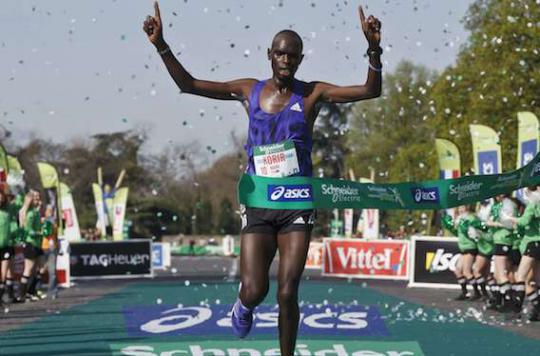Long-distance runners are said to have better reproductive capacities. This could be explained by a higher exposure in utero to testosterone.

Some marathoners, like Mark Korir, finished the Paris Marathon in just over two hours. Others took more than seven hours. The love of long-distance running is undoubtedly a signal of good reproductive health, according to a study from the University of Cambridge (United Kingdom). Published in PLOS One, she details the amazing relationship between testosterone exposure and athletic endurance.
Faster men
British researchers analyzed the performance of 542 participants – including 439 men – in the Robin Hood Half Marathon in Nottingham (United Kingdom). Using photocopies of their hands, each person’s prenatal testosterone exposure was assessed. Indeed, the ratio between the size of the index and that of the directory (digital ratio) is representative of the hormonal impregnation during fetal life.
During the marathon, the 10% of men most exposed to testosterone were on average faster (by 24 minutes) than the 10% least exposed, the study reveals.
Likewise, the 10% of women most exposed to testosterone were faster (by 12 minutes) than the 10% of men least exposed.
This in utero exposure to testosterone has already been associated with increased sexual appetite, greater sperm production, lower fidelity, but also better cardiovascular efficiency.
A sign of generosity
Men who are highly exposed to testosterone are therefore better distance runners. But this athletic endurance would also be a sign of better reproductive potential in the eyes of women, the researchers explain.
“In our hunter-gatherer past, women were able to see endurance racing as a sign of a good breeding partner,” says lead author Dr. Danny Longman. We thought that a better hunter would have more meat, a bigger and healthier family (…).
But the hunter-gatherers used an egalitarian system, with a distribution of meat that is still observed in tribes today. The ability to obtain meat emphasizes underlying traits of athletic endurance, intelligence – to hunt down and flush out prey – and generosity – to contribute to tribal society. Character traits that you want to pass on to your children. “
Designed for endurance
The capacity for endurance is the very trait of the human species. “Men are incredibly efficient long-distance runners, much like wolves or coyotes,” says Danny Longman. We sweat where most animals would be too hot; our tendons and posture are designed to propel the next stride. ”
From an evolutionary point of view, the development of endurance has also proved to be very useful for hunting, since it allows a minimal expenditure of energy for a maximum result. An asset that must have long been of crucial importance in the choice of sexual partners.
.

















